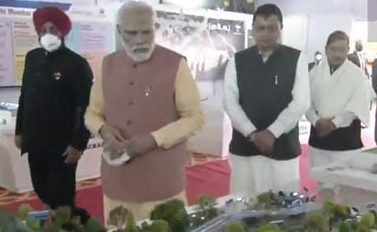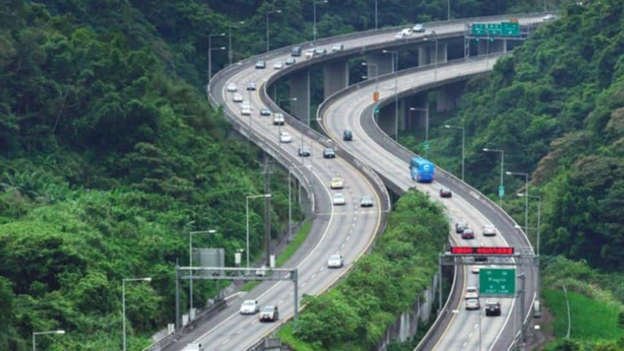Prime Minister Narendra Modi on Saturday laid the foundation stone of the Delhi-Dehradun Economic Corridor, which is likely to reduce the travel time between the two cities from six hours to two and a half hours.

Modi inaugurated this project being built at a cost of about Rs 8,300 crore in Dehradun.
There will be seven major interchanges in the corridor
The Prime Minister’s Office (PMO) further informed that the greenfield alignment project will have seven major interchanges connecting Haridwar, Muzaffarnagar, Shamli, Yamunanagar, Baghpat, Meerut, and Baraut.
It will also have Asia’s largest wildlife elevated corridor (12 km) for unrestricted movement of animals. Also, the 340-meter-long tunnel near Dat Kali Mandir, Dehradun, will help in minimizing the impact on wildlife, according to a PMO release.
Several animal passes are also being made in the Ganeshpur-Dehradun section to avoid a collision. The corridor will have rainwater harvesting and more than 400 water recharge points at an interval of 500 meters.
In addition, the government will construct a greenfield alignment project along the Delhi-Dehradun economic corridor connecting Halgoa, Saharanpur to Bhadrabad, Haridwar at a cost of over Rs 2,000 crore. This route will reduce travel time from Delhi to Haridwar.
PM to announce multiple projects worth around Rs 18,000 crore
The PMO said that on Saturday, the Prime Minister is inaugurating and laying foundation stones of several projects worth about Rs 18,000 crore. “An important focus of the Yatra will be on projects to improve the road infrastructure, which will make travel easier and safer, and also enhance tourism in the region. This is in line with the Prime Minister’s vision to boost connectivity in those areas. corresponds to where they were once considered far-flung.”
Apart from these, the Haridwar Ring Road project from Manoharpur to Kangri, to be constructed at a cost of over Rs 1600 crore, will decongest the city of Haridwar, especially during the peak tourist season. Subsequently, the Dehradun-Paonta Sahib, Himachal Pradesh road project, which will cost around Rs 1,700 crore, will reduce the travel time between the two places. Then the Nazimabad-Kotdwar road widening project will help in reducing the travel time to Lansdowne.
In line with Modi’s vision of developing smart spiritual cities and upgrading tourism-related infrastructure, the foundation stone for infrastructure development works at Shri Badrinath Dham and Gangotri-Yamunotri Dham will be laid. In addition, a new medical college will be built in Haridwar at a cost of over Rs 500 crore.
He will also inaugurate seven projects, including those that focus on making travel safer by tackling the problem of chronic landslides in the region.
The release of the PMO further said that a bridge will also be built on the river Ganga beside Lakshman Jhula. The world-famous Lakshman Jhula was constructed in 1929 but has now been discontinued due to its low load-carrying capacity. The bridge to be built will have a glass deck for pedestrians, as well as allow light vehicles to cross.
The Prime Minister will also lay the foundation stone of the Child-Friendly City Project, Dehradun to make the city child-friendly by making roads safe for his visit. The foundation stone of projects related to the development of water supply, road, and drainage systems will also be laid in Dehradun at a cost of over Rs 700 crore.
Projects focusing on tackling landslides
He will inaugurate seven projects, including those that focus on making travel safer by tackling the problem of chronic landslides in the region. He will also inaugurate the Hydroelectric Project and Himalayan Culture Center in Dehradun.
Earlier this year, the Ministry of Road Transport and Highways said in a statement, the corridor is designed for driving at a minimum speed of 100 kmph. He said, “Provision of roadside facilities has been made at every 25 km-30 km to enhance the road user experience. A closed toll mechanism will be adopted to enable payment toll only up to the extent of the highway used. “
“The development of this corridor is expected to give a boost to the economy of the region, which is being served by the highway, will give a boost to tourism, especially in Uttarakhand,” the statement said.
Here are the 10 key features of the project:
- The project is being implemented at an estimated cost of ₹ 8,300 crore. It will reduce the distance between Delhi and Dehradun by 25 km. The travel time will be reduced by three-and-a-half hours as vehicles will be allowed to move at a speed of up to 100 km per hour on the highway.
- The expressway will be the first in Asia to have a 12-km-long wildlife elevated corridor, which will allow unrestricted passage for wild animals.
- Several other animal passes have been planned on the highway in Uttarakhand, including a 340-metre tunnel near Dehradun.
- The highway will have seven major interchanges, connecting Haridwar, Muzaffarnagar, Shamli, Yamunanagar, Baghpat, Meerut, and Baraut.
- It will operate on the closed toll mechanism so that commuters pay a toll for only the distance they travel on the highway. Wayside amenities have been planned at every 25-30 km.
- The Delhi-Dehradun Economic Corridorwill have arrangements for rainwater harvesting every 500 metres. There will be more than 400 water recharge points spread along the route.
- The government also plans to build a greenfield alignment project from this corridor at a cost of ₹ 2,000 crore.
- The alignment will connect Halgoa, Saharanpur, Bahadrabad, and Haridwar and cut down travel time between Delhi and Haridwar.
- The highway will start at Akshardham Temple in Delhi and end in Dehradun, passing through districts of Baghpat, Shamli, Muzaffarnagar, and Saharanpur in Uttar Pradesh.
- The project is aimed at giving an economic boost to the areas between Delhi and Dehradun.

